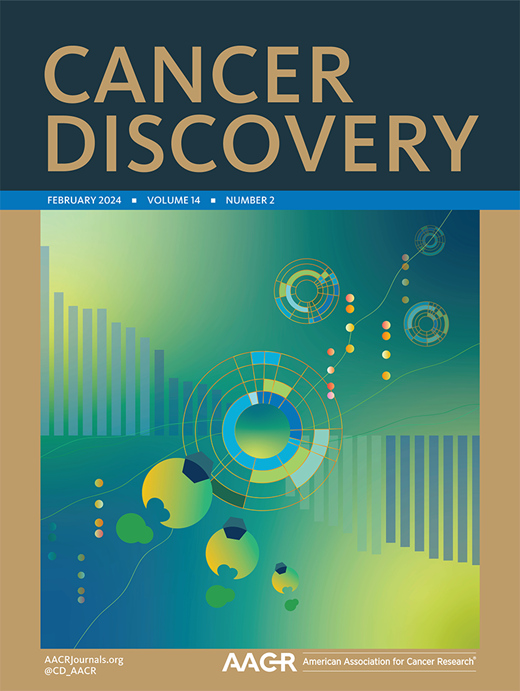RNA Shielding of p65 Is Required to Potentiate Oncogenic Inflammation in TET2-Mutated Clonal Hematopoiesis.
IF 29.7
1区 医学
Q1 ONCOLOGY
引用次数: 0
Abstract
Significance: This work identifies MALAT1 as a requisite downstream effector of oncogenic feedforward inflammatory circuits necessary for the development of TET2-mutated CH and fulminant myeloid malignancy. We elucidate a novel mechanism by which MALAT1 "shields" p65 from dephosphorylation to potentiate this circuit and nominate MALAT1 inhibition as a future therapeutic strategy.
在 TET2 突变的克隆造血过程中,需要 P65 的 RNA 屏蔽来增强致癌炎症。
TET2突变(mTET2)是髓系恶性肿瘤和克隆性造血(CH)中常见的遗传事件。这些突变发生在创始克隆中,与许多与致癌前馈炎症回路相关的临床后遗症有牵连。然而,mTET2 的直接下游效应器对这种炎症回路的增效作用尚不清楚。为了解决这个问题,我们在有或没有 TET2 基因突变的 COVID-19 患者中进行了 scRNA 和 scATAC-seq,理由是 COVID-19 引起的炎症可能会突出 mTET2 的关键下游转录靶标。利用这种方法,我们确定了可用于治疗的 lncRNA MALAT1,它是 mTET2 的核心下游效应物,对于诱导 mTET2 在体内的致癌促炎特征是必要且充分的。我们还阐明了 mTET2 上调 MALAT1 的机制,并描述了 MALAT1 与 P65 之间的相互作用,这种相互作用会导致 RNA "屏蔽 "PP2A 的去磷酸化,从而阻止炎症信号的传递。
本文章由计算机程序翻译,如有差异,请以英文原文为准。
求助全文
约1分钟内获得全文
求助全文
来源期刊

Cancer discovery
ONCOLOGY-
CiteScore
22.90
自引率
1.40%
发文量
838
审稿时长
6-12 weeks
期刊介绍:
Cancer Discovery publishes high-impact, peer-reviewed articles detailing significant advances in both research and clinical trials. Serving as a premier cancer information resource, the journal also features Review Articles, Perspectives, Commentaries, News stories, and Research Watch summaries to keep readers abreast of the latest findings in the field. Covering a wide range of topics, from laboratory research to clinical trials and epidemiologic studies, Cancer Discovery spans the entire spectrum of cancer research and medicine.
 求助内容:
求助内容: 应助结果提醒方式:
应助结果提醒方式:


